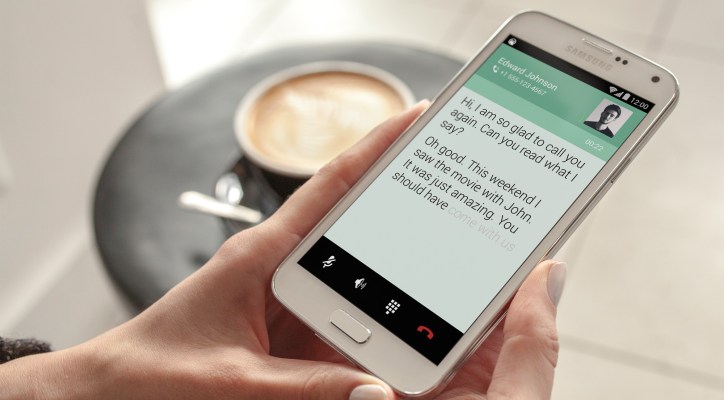This is where technology shines — RogerVoice is not yet another Uber for X. It will potentially help millions of hard-of-hearing people by letting them make phone calls. Some of them might even make their first phone call through the app. To do this, RogerVoice subtitles phone conversations in real time, so that you can read what the other person is saying.
The French startup has been working on the technology behind RogerVoice for around a year. Now, it is raising a bit of money through a Kickstarter campaign to build the final Android app (and later iOS). At heart, RogerVoice is a VoIP app that intercepts your recipient’s voice to transcribe it. A third-party real time transcription service pushes the result to your phone. It works in a dozen of languages already.
On the other end of the call, your recipient can hear you like a normal phone call. This is key to using a service like this one. The people you call don’t have to install an app and there is no third-party human involved. RogerVoice is here when you need it, it just works.
Back in April, co-founder and CEO Olivier Jeannel showed me a prototype of RogerVoice. He is deaf and relies on lip-reading most the time. But he made a phone call in a loud room right in front of me. The product was nowhere near as polished as it should be, but it was a truly remarkable experience.
Imagine the possibilities. What if you want to talk to your grandparents and they don’t use text messages or email? What if you need to call your bank or your doctor? What about your kid? While I don’t have hearing loss, I could immediately see the immediate benefits of having an app like RogerVoice.
There is no text-to-speech feature yet, which means that it is not yet ready for profoundly deaf people who do not talk. Similarly, you can only make phone calls and not receive them. All of this is planned.
Every time someone asks me why I love technology, I don’t have a simple answer. As Sarah Perez wrote, we were promised flying cars, but most of what we can see is useless services that automate the not-so-hard parts of the life of your friends who live in San Francisco and are disconnected from the real world.
Startup founders promise that they are going to change the world. Some of them do, most don’t. Don’t get me wrong, I’m not blaming anyone. Making things a little bit easier for hundreds of thousands of people is already a great achievement — but don’t overpromise.
There is nothing special about RogerVoice. It’s a VoIP service with a twist. But there is nothing special as well about finding a good product market fit for your Uber for X. Founders choose to tackle different kinds of problems.
Technology has the potential of profoundly altering how we communicate, share information and learn. It brings people, things and services together that couldn’t be brought together before. Some entrepreneurs are amazingly good and will build massive photo sharing apps — and all of your friends will use this app. Yet, in the meantime, there are huge areas of opportunity that are neglected because we were all obsessed with our tiny community of urban early adopters who are constantly looking for the next big thing.
I believe RogerVoice is a good example of real world tech. It is not shiny, it won’t have hundreds of millions of users, but it can significantly change the life of a lot of people. It isn’t the next big thing. But we need more real world tech like this.
